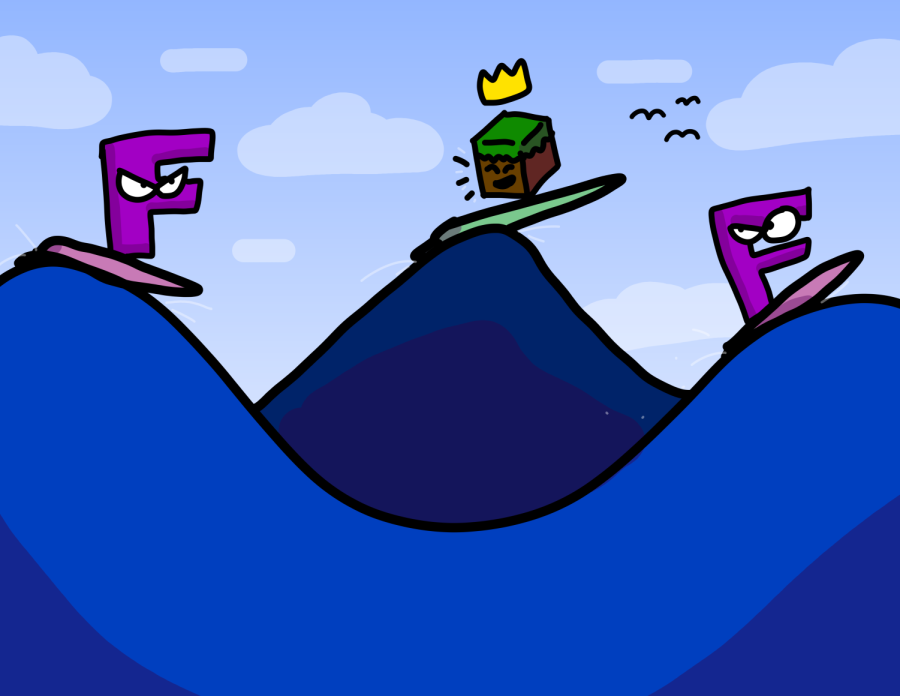The Gaming Ghost – Vol. 2: Waves of Popularity
Minecraft’s catching the highest wave here… But Fortnite might be sneaking back up!
April 5, 2022
Nostalgia is a strange, strange thing. The internet, as well, is a very strange thing. When you add these two together, some interesting things start to pop up. Hello again everyone, I’m Josh, and today, we’re going surfing! Yes, today we are surfing something I like to call the Waves of Popularity. These waves are formed by the internet, in which a game gets popular, loses steam, and then in a few years comes back due to immense nostalgia. So grab your surfboards and let’s dive in!
Here’s a question: why do old games get popular again? Is it the charming old graphics? Is it the old-style chiptune music? The truth is, more often than not, old games see the light of day again because of nostalgia. When a 40-something-year-old finds a Nintendo Entertainment System in their parents’ attic, they don’t necessarily dance about it because the games are high-quality, but because of the associated memories of their carefree childhood.
Playing old games can be a comfort to the people that grew up with them, and they remember their cherished memories not just in the game, but surrounding the game as well. To this day, when I boot up my old Wii to play some Wii Sports Resort, I find myself smiling, thinking about when my biggest problems were finding something to bring to show and tell.
Today, however, the internet is a huge factor in accelerating video game nostalgia. When people can post about their old favorite games, it’s like a beacon, attracting other old fans and even introducing new ones to those games and happy memories. This is expected and a wonderful part of game culture.
But here’s where the water gets choppy: people nowadays can end up nostalgic for games that were popular just a couple years ago that they previously hated. It seems each time a game takes the internet by storm, it drastically loses popularity after a relatively brief period of time. Why is this? Where does this sudden game resentment come from? To find out, let’s look at a few recent examples.
The smash-hit indie game Minecraft revolutionized the gaming industry. Getting its start in 2009, Minecraft rose to its internet-stardom peak at around 2014. While the game maintained a strong player base, veteran players started to lose interest when the game got too popular and mainstream.
When a game goes viral, new, young players come. In Minecraft’s case, the horde of children grew and grew, while the original audience faded away. Minecraft had gained a reputation for being a kid’s game. Little Timmy in his Creeper hoodie was the new depiction of the average fan of the game.
Thus, older fans left the game behind, and those who still enjoyed the game weren’t too outspoken about it. It seemed as though Minecraft would fade into obscurity after it fell off the throne.
Who took the throne, you may ask? I present to you: Fortnite.
Fortnite, hot off the presses by the famous Epic Games game development company, was all the rage for a good couple of years, notably passing League of Legends in views on Twitch in March 2018. Previously, League had been the reigning champion of Twitch for a long, long time. But Fortnite too would see the end of its glory days by the start of 2019.
Now, what game could possibly take Fortnite’s place? Well, this is where something unforeseen happened. You see, kids who had grown up on Minecraft in its glory days had become old enough to chat online and become active content creators. With these old fans came a wave of nostalgia for Minecraft.
Many players, such as I, associated Minecraft with their carefree childhood. This perfect storm caused a major revival of Minecraft online, taking the internet by storm once again. Content creators who had once belittled the game for being for kids, such as PewDiePie, began to play and post about the game. Minecraft was back from the dead.
I believe every popular game will catch a second wave of popularity thanks to this cycle. Children grow up with a game, and when they get older, they associate the game with their childhood. The game is a memory, something that developed them at a young age. Oftentimes, people want to go back to their roots by revisiting a formative childhood memory. This is no different from listening to Party Rock Anthem to feel like it’s the early 2010s again. It can be as sentimental as an old photo book filled with good memories.
This sort of widespread nostalgia was never possible before the internet. Games would get popular, hit their peak, and then fade into nothingness. Nowadays, because of these waves of popularity and nostalgia, every game has a shot at a revival after a few years.
This is further proven when looking at internet search data. According to Google Trends, the search term “Fortnite” is on the rise once again for the first time since early 2019. Other games like Undertale, Cuphead, Celeste, and Mario Kart Wii had a resurgence in popularity because of this cycle.
All of these games had either been hated on or were lost to time, but they came back strong because of society’s collective need to relive better days. While that might seem depressing, we can all take comfort in knowing that no matter how hard life gets, the games we cherished can always be replayed. It’s okay to give in to nostalgia and let the waves crash over you.








